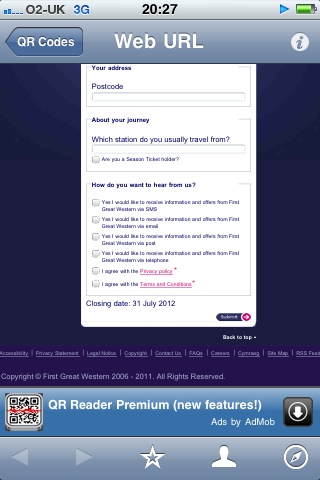Hi First Great Western
Usually, I’m a pretty happy customer. I travel on this London-Bristol line frequently. Even when the train is slow, sweaty, windy or as the French say ‘retarded’, I’m cool. It’s a far cry from the land of No Public Transport and I deeply appreciate links that allow me to drink wine.
Tonight, I see you’ve gotten a little fancy with your marketing. A QR code promotion on the seat cards.
Now I’m a QR code skeptic. Use ’em if you have a hitech geeky audience. Use ’em if you have a long web link impossible to communicate and more of your audience will get a QR code than a pain in the arse URL to type in. Not so much of ‘helpful’ for the Gen Pop. Mobile (read sms) is SO much more accessible, so lead with that instead… Although kudos for having text and web links as a secondary.
But heck, I’m a little hitech, a little geeky. So I’ll play.

What I get is a link to a web form, non mobile ‘happy’ and what I would term ‘demanding’. And what’s the incentive for completing this demanding form?
A Kindle. Non-specific variant*.
And the kicker? 5 Kindles to be won. Winners to be notified August 2012.
Context, in case you’re reading this in the future: it’s only September. 2011. I can’t wait to win obsolete tech next year. Maybe.
I really hope you’ve also created unique QR codes related to the trip data of each card so that you can get some context to your data. I also wish that you’d just popped a really simple social sharing incentive into the campaign – why not, especially when you’re probably going to be running it all year!
Thanks for listening, FGW.
*always a geek requirement – we want to know it’s not the one without Internet






